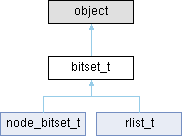|
| | __init__ (self, *args) |
| |
| None | swap (self, 'bitset_t' r) |
| |
| 'bitset_t &' | copy (self, 'bitset_t' m) |
| |
| bool | add (self, *args) |
| |
| bool | sub (self, *args) |
| |
| bool | cut_at (self, int maxbit) |
| |
| None | shift_down (self, int shift) |
| |
| bool | has (self, int bit) |
| |
| bool | has_all (self, int bit, int width) |
| |
| bool | has_any (self, int bit, int width) |
| |
| str | dstr (self) |
| |
| bool | empty (self) |
| |
| int | count (self, *args) |
| |
| int | last (self) |
| |
| None | clear (self) |
| |
| None | fill_with_ones (self, int maxbit) |
| |
| bool | has_common (self, 'bitset_t' ml) |
| |
| bool | intersect (self, 'bitset_t' ml) |
| |
| bool | is_subset_of (self, 'bitset_t' ml) |
| |
| bool | includes (self, 'bitset_t' ml) |
| |
| bool | __eq__ (self, 'bitset_t' r) |
| |
| bool | __ne__ (self, 'bitset_t' r) |
| |
| bool | __lt__ (self, 'bitset_t' r) |
| |
| bool | __gt__ (self, 'bitset_t' r) |
| |
| bool | __le__ (self, 'bitset_t' r) |
| |
| bool | __ge__ (self, 'bitset_t' r) |
| |
| int | compare (self, 'bitset_t' r) |
| |
| 'bitset_t::iterator' | itat (self, int n) |
| |
| 'bitset_t::iterator' | begin (self) |
| |
| 'bitset_t::iterator' | end (self) |
| |
| int | front (self) |
| |
| int | back (self) |
| |
| None | inc (self, 'iterator' p, int n=1) |
| |
| int | itv (self, 'iterator' it) |
| |
| | __iter__ (self) |
| |
◆ __init__()
| __init__ |
( |
| self, |
|
|
* | args ) |
◆ __eq__()
◆ __ge__()
◆ __gt__()
◆ __iter__()
◆ __le__()
◆ __lt__()
◆ __ne__()
◆ add()
| bool add |
( |
| self, |
|
|
* | args ) |
This function has the following signatures:
0. add(bit: int) -> bool
1. add(bit: int, width: int) -> bool
2. add(ml: const bitset_t &) -> bool
# 0: add(bit: int) -> bool
# 1: add(bit: int, width: int) -> bool
# 2: add(ml: const bitset_t &) -> bool
◆ back()
◆ begin()
| 'bitset_t.iterator' begin |
( |
| self | ) |
|
◆ clear()
◆ compare()
◆ copy()
◆ count()
| int count |
( |
| self, |
|
|
* | args ) |
This function has the following signatures:
0. count() -> int
1. count(bit: int) -> int
# 0: count() -> int
# 1: count(bit: int) -> int
◆ cut_at()
| bool cut_at |
( |
| self, |
|
|
int | maxbit ) |
◆ dstr()
◆ empty()
◆ end()
| 'bitset_t.iterator' end |
( |
| self | ) |
|
◆ fill_with_ones()
| None fill_with_ones |
( |
| self, |
|
|
int | maxbit ) |
◆ front()
◆ has()
| bool has |
( |
| self, |
|
|
int | bit ) |
◆ has_all()
| bool has_all |
( |
| self, |
|
|
int | bit, |
|
|
int | width ) |
◆ has_any()
| bool has_any |
( |
| self, |
|
|
int | bit, |
|
|
int | width ) |
◆ has_common()
◆ inc()
| None inc |
( |
| self, |
|
|
'iterator' | p, |
|
|
int | n = 1 ) |
◆ includes()
◆ intersect()
◆ is_subset_of()
| bool is_subset_of |
( |
| self, |
|
|
'bitset_t' | ml ) |
◆ itat()
| 'bitset_t.iterator' itat |
( |
| self, |
|
|
int | n ) |
◆ itv()
◆ last()
◆ shift_down()
| None shift_down |
( |
| self, |
|
|
int | shift ) |
◆ sub()
| bool sub |
( |
| self, |
|
|
* | args ) |
This function has the following signatures:
0. sub(bit: int) -> bool
1. sub(bit: int, width: int) -> bool
2. sub(ml: const bitset_t &) -> bool
# 0: sub(bit: int) -> bool
# 1: sub(bit: int, width: int) -> bool
# 2: sub(ml: const bitset_t &) -> bool
◆ swap()
◆ thisown
Initial value:= property(lambda x: x.this.own(), lambda x, v: x.this.own(v),
doc='The membership flag')
The documentation for this class was generated from the following file:
